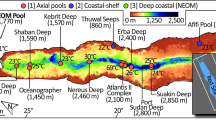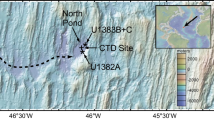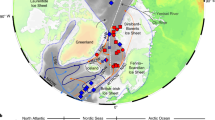Abstract
THE hot, highly saline waters in a limited area at the bottom of the Central Red Sea have attracted much interest since they were reported by Swallow and Crease1. More recently, Miller et al.2 have distinguished two deeps, separated by a distance of about 4 km (Fig. 1). The temperature of the bottom brines in Discovery Deep was approximately 44° C, and that of the bottom brines in Atlantis II Deep was 56° C, though in both cases there are layers of water at intermediate temperatures overlying the hottest bottom water, and below the normal 22° C Red Sea bottom water.
This is a preview of subscription content, access via your institution
Access options
Subscribe to this journal
Receive 51 print issues and online access
$199.00 per year
only $3.90 per issue
Buy this article
- Purchase on Springer Link
- Instant access to full article PDF
Prices may be subject to local taxes which are calculated during checkout
Similar content being viewed by others
References
Swallow, J. C., and Crease, J., Nature, 205, 165 (1965).
Miller, A. R., et al., Geochim. Cosmochim. Acta, 30, 341 (1966).
Lister, C. R. B., Geophys. J., 1, 571 (1963).
Horton, J. W., quoted by Vigoureux, P., and Hersey, J. B., in The Sea (edit. by Hill, M. N.), 1 (1963).
Author information
Authors and Affiliations
Rights and permissions
About this article
Cite this article
PUGH, D. Origin of Hot Brines in the Red Sea. Nature 214, 1003–1004 (1967). https://doi.org/10.1038/2141003a0
Received:
Published:
Issue Date:
DOI: https://doi.org/10.1038/2141003a0
This article is cited by
-
Hydrographische Bibliographie
Deutsche Hydrographische Zeitschrift (1968)
Comments
By submitting a comment you agree to abide by our Terms and Community Guidelines. If you find something abusive or that does not comply with our terms or guidelines please flag it as inappropriate.



